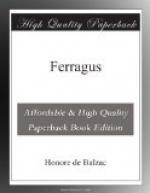Auguste de Maulincour flung himself into this ardent existence passionately, for he felt all its pleasures and all its misery. He went disguised about Paris, watching at the corners of the rue Pagevin and the rue des Vieux-Augustins. He hurried like a hunter from the rue de Menars to the rue Soly, and back from the rue Soly to the rue de Menars, without obtaining either the vengeance or the knowledge which would punish or reward such cares, such efforts, such wiles. But he had not yet reached that impatience which wrings our very entrails and makes us sweat; he roamed in hope, believing that Madame Jules would only refrain for a few days from revisiting the place where she knew she had been detected. He devoted the first days therefore, to a careful study of the secrets of the street. A novice at such work, he dared not question either the porter or the shoemaker of the house to which Madame Jules had gone; but he managed to obtain a post of observation in a house directly opposite to the mysterious apartment. He studied the ground, trying to reconcile the conflicting demands of prudence, impatience, love, and secrecy.
Early in the month of March, while busy with plans by which he expected to strike a decisive blow, he left his post about four in the afternoon, after one of those patient watches from which he had learned nothing. He was on his way to his own house whither a matter relating to his military service called him, when he was overtaken in the rue Coquilliere by one of those heavy showers which instantly flood the gutters, while each drop of rain rings loudly in the puddles of the roadway. A pedestrian under these circumstances is forced to stop short and take refuge in a shop or cafe if he is rich enough to pay for the forced hospitality, or, if in poorer circumstances, under a porte-cochere, that haven of paupers or shabbily dressed persons. Why have none of our painters ever attempted to reproduce the physiognomies of a swarm of Parisians, grouped, under stress of weather, in the damp porte-cochere of a building? First, there’s the musing philosophical pedestrian, who observes with interest all he sees,—whether it be the stripes made by the rain on the gray background of the atmosphere (a species of chasing not unlike the capricious threads of spun glass), or the whirl of white water which the wind is driving like a luminous dust along the roofs, or the fitful disgorgements of the gutter-pipes, sparkling and foaming; in short, the thousand nothings to be admired and studied with delight by loungers, in spite of the porter’s broom which pretends to be sweeping out the gateway. Then there’s the talkative refugee, who complains and converses with the porter while he rests on his broom like a grenadier on his musket; or the pauper wayfarer, curled against the wall indifferent to the condition of his rags, long used, alas, to contact with the streets; or the learned pedestrian who studies, spells, and reads the posters on the walls without




